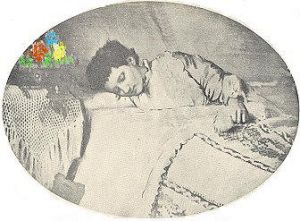Summary | Excerpt | Reviews | Beyond the Book | Read-Alikes | Genres & Themes | Author Bio

This article relates to The Wonder
The Wonder was inspired by several real-life instances of girls who claimed to be beyond the earthly requirement of eating. The tradition dates back to at least medieval times when it was common for devoutly religious women to abstain from food, among other essentials. Intermittent fasting is a common custom in many religions and viewed as a sign of pious constraint.
Historian Rudolph Bell coined the term "holy anorexia" to describe this practice, associated with the 13th and 14th-century saints, St. Catherine of Siena and St. Clare of Assisi, among others. St. Catherine was known for extreme fasts and reportedly suffered "grievous pains" when she was forced to eat. St. Clare commonly fasted three days out of the week.
Perhaps the most famous of these girls, and the one most like The Wonder's Anna O'Donnell, is Sarah Jacob, a Welsh girl who ceased eating in 1867. Indeed, she was referred to locally as "The Wonder" and just like in Anna's case, a team of medical advisers was established to watch Sarah around the clock to determine if she truly did not eat. As time passed, there were warnings: Doctors noted her "altered appearance," "heightened pulse," and "flushed face" with concern. After seven days, she died. The parents were charged and convicted of manslaughter.
 Mollie Fancher, known as "The Brooklyn Enigma," suffered a catastrophic injury after falling out of a carriage in 1865 when she was eighteen. After enduring a battery of quack medical practices that failed to heal her, Mollie fell into a nine-year "trance" wherein she claimed to speak to the dead, have out-of-body experiences, and require no sustenance. Mollie lived until 1915 and the truth about her diet was never determined.
Mollie Fancher, known as "The Brooklyn Enigma," suffered a catastrophic injury after falling out of a carriage in 1865 when she was eighteen. After enduring a battery of quack medical practices that failed to heal her, Mollie fell into a nine-year "trance" wherein she claimed to speak to the dead, have out-of-body experiences, and require no sustenance. Mollie lived until 1915 and the truth about her diet was never determined.
Josephine Marie Bedard of Boston, "The Tingwick Girl," had her supposed seven-year fast declared fraudulent after Dr. Mary Walker, who was investigating the case, claimed the girl had taken a bite of a doughnut she had in her pocket.
Like Mollie Fancher, Therese Neumann, who lived in 20th century Germany, suffered a physical trauma prior to commencing her fast, falling off of a stool while trying to put out a fire. In addition to "being sustained only by Holy Communion," Neumann allegedly bled from the eyes and exhibited stigmata (visible marks on the hands, wrists, and feet that mimic those Jesus suffered at the crucifixion).
Picture of Mollie Fancher from Unexplainable.net
Filed under Cultural Curiosities
![]() This "beyond the book article" relates to The Wonder. It originally ran in October 2016 and has been updated for the
September 2017 paperback edition.
Go to magazine.
This "beyond the book article" relates to The Wonder. It originally ran in October 2016 and has been updated for the
September 2017 paperback edition.
Go to magazine.
Your guide toexceptional books
BookBrowse seeks out and recommends the best in contemporary fiction and nonfiction—books that not only engage and entertain but also deepen our understanding of ourselves and the world around us.